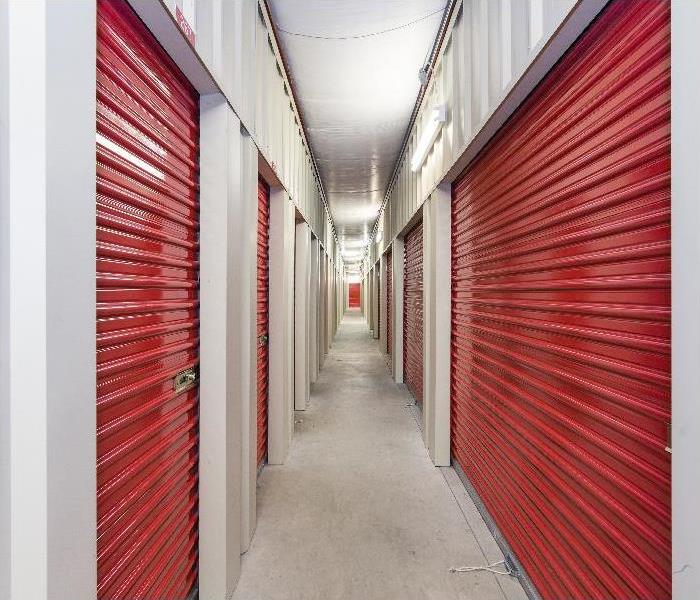How Can I Clean Storage Units In Plantation After Heavy Rain?
6/19/2020 (Permalink)
 When commercial water issues threaten your business and your relationship to clients, contact SERVPRO.
When commercial water issues threaten your business and your relationship to clients, contact SERVPRO.
SERVPRO Provides Commercial Water Cleanup to Businesses in Plantation Within Four Hours of Notification of Loss.
Who is responsible for water-related storage damages?
Clients renting storage in Plantation are usually responsible for keeping their unit in a usable condition. However, if water loss is the result of poor general maintenance like leaking roofs or internal drainage issues, the responsibility may lie with the unit manager. It is crucial to provide secure storage for those renting units, and water losses can affect not only the structure of the unit but also the contents within. Maintaining good relationships with renters is as crucial as your reputation for secure storage. SERVPRO offers commercial water restoration callouts to help you keep a positive relationship with your clients and to provide decisive mitigation of any damages.
How does water damage occur in storage units?
One of the main reasons businesses require commercial water cleanup in Plantation is due to the unit's structural condition. Unlike residential properties, storage units tend to have less activity and interaction. These can mean that small holes or leakages go without notice until there is substantial rainfall. The construction method of a storage unit may also increase its susceptibility to water intrusion and damage. These builds tend to have little to no insulation, which can make them extra vulnerable to temperature changes which cause condensation. Finally, a storage unit with water intrusion may go unnoticed for several weeks, which can exacerbate the problem.
Does water damage get worse over time?
Without timely intervention, clean water supplies like rainwater can pool on floors or walls. With a lack of ventilation or airflow, these areas of moisture can stagnate or promote microbial growth. SERVPRO can address these issues by thoroughly disinfecting the affected area to remove any contaminants then dispersing anti-microbial chemicals through a mister to prevent mold from recurring. When there is long-term exposure to materials, it is not uncommon to find sheetrock or concrete floors cracking. These fissures can then be painful to clean or, on walls and ceilings, affect the structural integrity of the unit itself, exposing it to further harm.
What should I do when there is a water leak in storage?
• Remove items from the affected area and isolate them
• Extract excess water
• Put in place an appropriate drying system
What happens to contents during storage unit restoration?
The contents of a storage unit can hold sentimental value to your clients. But when contents are packed together, they are more likely to suffer from microbial growth or water degradation. SERVPRO can set up a clean zone to place possessions while basic cleanup takes place. When there is severe water intrusion or standing water, it may be necessary to remove the contents altogether. For these circumstances, we have temporary storage facilities in a climate-controlled warehouse and can arrange for professional removal on your behalf. Once the structure returns to a sanitary state, we can return content to their original places in the unit.
How do you set up a clean zone for content restoration?
• Select a cool, dry area of the site for a clean zone
• Seal the area by placing plastic sheeting on the ground. If necessary, create a tent around the sheeting
• Place items individually and in isolation
• Establish dehumidification to prevent mold growth
Do commercial restorers fix roof leaks?
Holes in the roof of your build can lead to continuous water exposure throughout the year. SERVPRO technicians can mitigate against roof leaks by fixing a tarpaulin over the damaged roof. In wet conditions, these tarpaulins can provide a robust stopgap solution until a professional roofer arrives. We can arrange for a roofer to fix any longer-term problems on your behalf. Any additional service requirements we include within the documentation that we pass to your insurer while you have the convenience of only dealing with one company throughout the process.
Is it challenging to dry properties with structural issues?
Storage units can present several challenges to normal drying conditions. Higher ceilings or exposed walls and roofs can result in droughts. Proper drying techniques focus on controlling all aspects of the affected area using air-movers, heaters, and dehumidifiers. Droughts can present an unknown variable to the equation and slow drying times when working on commercial sites where there is high exposure to outdoor elements. Our technicians can control these variables by setting up drying tents. Using sand-bags to pin the edges of a polyethylene sheet to the floor, we can attach dehumidifiers or air-movers beneath the sheeting to create an air tent. Drying concrete floors can be much more time and energy efficient using drying tents rather than controlling the entire space.
When commercial water issues threaten your business and your relationship to clients, contact SERVPRO of Ft. Lauderdale South at (954) 776-2000.






 24/7 Emergency Service
24/7 Emergency Service